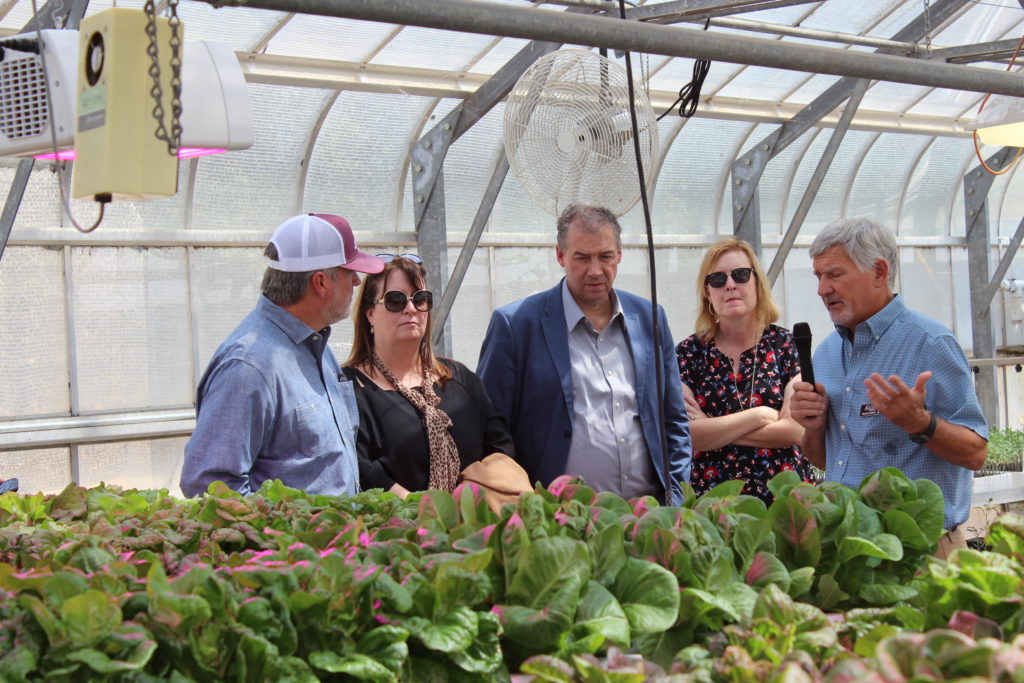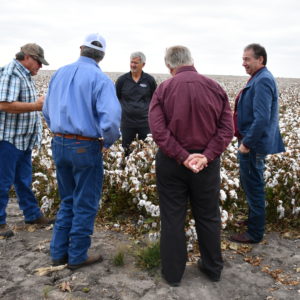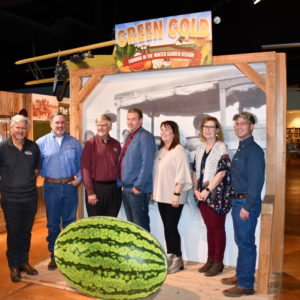Texas A&M AgriLife administrators visit AgriLife center in Uvalde

Patrick Stover, Ph.D., director of Texas A&M AgriLife Research and vice-chancellor and dean for the College of Agriculture and Life Sciences, and other Texas A&M AgriLife administrators recently completed a two-day visit to the Texas A&M AgriLife Research and Extension Center in Uvalde to get a first-hand look at the facility and work being done there.
Daniel Leskovar, Ph.D., Uvalde center director and AgriLife Research vegetable physiologist, and Michael Haynes, District 10 administrator for Texas A&M AgriLife Extension Service, led the tour, in which new AgriLife Extension director Jeff Hyde, Ph.D, College Station, also participated.

Others touring the center included Denise Stover, an AgriLife Research associate research scientist in the Department of Nutrition and Food Sciences and Stover’s wife; Susan Ballabina, Ph.D., deputy vice-chancellor Texas A&M AgriLife; and David Ragsdale, Ph.D., chief scientific officer and associate director, AgriLife Research, all from College Station. Also attending was Joe Cox, assistant vice-chancellor, Texas A&M AgriLife, Temple.
“Centers like this one in Uvalde — and other AgriLife centers around the state — are important in providing research and educational outreach agricultural producers and others can use to improve their operations and quality of life,” Stover said in an address to center personnel. “We want Texas A&M AgriLife to be more than the sum of its parts. We also want to address aspects of policy, production and consumer benefit.”
Stover also noted the importance of the center in helping improve human health through research and testing toward the development of more nutritious vegetables.
Leskovar provided program session tours of the facility’s laboratories, greenhouses, high tunnels, netting house, sensing tools and technology, and cutting-edge work in irrigation. He also provided information on the research being done on systems plant physiology, olive and sesame production, hydroponics and LED lights, soil health, tomato grafting, wildlife, vegetable breeding and phenotyping.
AgriLife Extension faculty provided the group with information on Extension programming, including work on pomegranates and citrus, grapes, range management and birding, sheep and goat market research and 4-H programming.
During the evening of the first day, AgriLife administrators and center faculty met with about 30 area producers to discuss their agricultural needs and challenges and to see how the center could help them meet their operational goals.

“This center plays a vital role in helping these producers with their operations through its research, sharing best practices and use of the latest technology to help them improve their efficiency and profitability,” Leskovar said. “We have a great relationship with area producers and they are very amenable to our working with them on our research and doing field testing using their fields. And the entire community has been very supportive and appreciative of our Extension education programming for youth and adults.”
On the second day of the tour, AgriLife administrators went to producer locations in the Texas Winter Garden area to get an up-close look at their operations and ask about challenges to production and profitability. Stops included Winter Garden Produce and Center Pivot Farm in Uvalde and L&L Farms in Batesville.
“Being part of these center tours has been interesting and has really shown me the variety and diversity of agricultural production throughout the state,” Denise Stover said. “Each of these centers plays an important role not only for the improvement of agricultural production and profitability but also for improving the lives of the people in the communities where they are located.”


